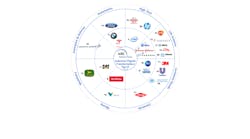'Digital Transformation': Scaling Technology Successes Remains Challenging
Manufacturers don't implement new technologies with an eye toward individual plants or tasks only. The idea, or hope, is to scale those technologies and improve processes at every plant, for every product and for every operator.
Successful implementations also teach new ways of thinking about processes and possibilities. Manufacturers want to scale those evolutions of thinking, as well. When and only if digital evolution takes place at that scale does the word “transformation” become an accurate replacement for “evolution. ”
And even the companies that are most successful at evolving their companies digitally haven't figured out the scaling problem yet.
Those are my words, not the words of the ARC Advisory Group's second annual report, “Industrial Digital Transformation Top 25 for 2022,” one of the topics of conversation at the ARC Industry Leadership Forum held this year from Feb. 6 to Feb. 9 in Orlando, Florida. (You can download the report on the ARC Advisory Group website.)
But the report does make it clear that scaling is the biggest challenge facing companies that want to evolve digitally.
The top 25 list highlights companies most successfully integrating digital technology into their organizations according to ARC and the trends driving these efforts, such as the pursuit of sustainability and the aforementioned scaling challenges. It also broadly describes the efforts taken by each company on the list. Pfizer, Tesla, Intel, Johnson & Johnson and BMW Group lead the pack and represent a wide range of technology implementations and organizational philosophies.
Looking at things broadly, I think, makes clear the nature of the “biggest challenge.” Digital evolution is not a one-size-fits-all matter. The available technologies are like cards in a deck: Additive manufacturing, AI, cloud-based technologies, IIoT systems, data analytics, digital twins. Which card should a company play and where within its organization?
The companies leading the charge, according to the report, are large and control tremendous resources to throw at digital evolution. Risking failed technology implementations and pilot purgatory mean much less to Pfizer than to a small elastomer manufacturer taking burgeoning steps into digitization.
So there’s something refreshing and validating to think that even companies of the size cited in the ARC report, with so much capital to expend and so many potential use cases to explore, struggle with the same challenges as the much smaller companies trying to best employ digital technology. The manufacturing community will continue learning together for as long as new technologies mature and make their way to the factory floor.
Here are the top ten companies ARC identifies as most successfully blazing the trail for digital evolution in the manufacturing industry:
Pfizer
Tesla
Intel
Johnson & Johnson
BMW Group
Danaher
Caterpillar
Nestlé
Rio Tino Group
Procter & Gamble
About the Author
Dennis Scimeca
Dennis Scimeca is a veteran technology journalist with particular experience in vision system technology, machine learning/artificial intelligence, and augmented/mixed/virtual reality (XR), with bylines in consumer, developer, and B2B outlets.
At IndustryWeek, he covers the competitive advantages gained by manufacturers that deploy proven technologies. If you would like to share your story with IndustryWeek, please contact Dennis at [email protected].

